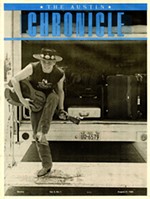Roadblocks
Cap Metro blames woes on voters and Lege
By Lee Nichols, Fri., Oct. 16, 2009
What Capital Metro is complaining about is a restriction that is unique among transit agencies in Texas and possibly nationwide: Under Section 451.071 of the Texas Transportation Code, the agency is required to hold a public referendum to operate passenger rail service – a requirement that the law slaps only onto Cap Metro. (SB 1263 eased the law a bit, allowing for minor expansions of a system already approved, but a vote would still be required for any new rail lines.)
That requirement tripped up Cap Metro in 2000, when voters narrowly rejected its proposal for light rail. The citizenry then changed its mind in 2004, when the agency came back with a much more limited proposal for a single train, the Leander-to-Austin MetroRail Red Line, which has since caused the agency headaches and the public consternation as costs have been higher than originally projected and the announced starting date has been pushed back indefinitely.
But in the self-evaluation, Cap Metro says those headaches were caused by the vote itself.
"Typically, a transit agency may spend as much as $10 [million] to $20 million on advance planning and design for a rail project, and it is normal for the work to span a couple of years," the report states. "However, due to the referendum requirement, Capital Metro was concerned that the expenditure of engineering funds prior to obtaining voter approval could taint public opinion. Thus, the agency made the decision [to] wait until after the referendum was approved prior to developing and reconciling the majority of engineering issues.
"Had Capital Metro not felt it was in a position to have to forgo the kind of advance design and engineering that is critical for projects of this scale, the agency would have had more comprehensive and realistic information about the scope of the project, both in terms of costs and schedule, and, further, it would have enabled the electorate to be better informed."
So there. It's your fault.
Other major conclusions of the report:
• Central Texas' population growth is expected to explode outside Cap Metro's service area, but a statute capping sales taxes in those jurisdictions hinders the areas' ability to join the agency.
• Capital Metro is required to provide free paratransit service to disabled individuals under the Americans With Disabilities Act. That service currently eats up about 20% of the agency's budget to serve 2% of its riders, and current congressional proposals to broaden the definition of "disability" will increase those costs.
• If the Legislature would lift a ban on alcohol-related advertising on buses, Cap Metro could bring in another $124,950 in revenue. Hey, who says alcohol and vehicles don't mix? (As noted in "The No. 3 Bus Pub Crawl," Food, Aug. 21, we love the No. 3 Burnet/Manchaca bus for pub crawls.)
• If the Legislature would allow jurisdictions (especially urban and near-urban counties) stronger land-use control, Cap Metro could better serve growing populations. As the report put it, "When jurisdictions plan land uses that are supportive of transit, Capital Metro can then plan supportive transit for such development."
Got something to say on the subject? Send a letter to the editor.










